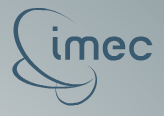Focus on Belgium: IT research and development on the rise
Keen to build a base for technology innovation and excellence in the centre of Europe, Belgium's IMEC is investing in IT development, producing advances in hardware as well as software technology.

With so much of the IT industry being outsourced or relocated to Asia, it is unusual to find a European country throwing so much into homegrown technology innovation and development.
However, in order to remain one of the leading technology hubs in Europe, Belgium is continuing to focus on public sector-driven investment in IT research and development, in stark contrast to other European countries where the private sector has taken the lead role in funding and driving academic research and development.
In contrast to the UK, outsourcing has largely been shunned by Belgian companies and public sector bodies, preferring to keep manufacturing, and the development of a skilled workforce within the country.
One example of this is IMEC, government-founded independent research and development body that funds and incubates research and IT development in Belgium, working in conjunction with universities and with commercial companies to develop technologies as well as skills.
IMEC has engineers and scientists from over 50 countries including the US, China, Spain and Mexico working at its main facility in Leuven, near Brussels. IMEC develops micro and nanoelectronics as well as nanotechnology, and even has two clean rooms for manufacturing of silicon.
"For example, we are developing new ways of making resistors, 3D integration for stacking integrated circuits and perfecting clean manufacturing processes," said Maarten Willems, head of emerging business at IMEC.
Household name chipmakers including Intel, Samsung, IBM, Micron and Texas Instruments are partnering with IMEC to develop technologies in Belgium.
Get the ITPro. daily newsletter
Receive our latest news, industry updates, featured resources and more. Sign up today to receive our FREE report on AI cyber crime & security - newly updated for 2024.
"Other things we are working on is developing technology for biomedical applications, along with technologies for intelligent environments and even energy technologies such as working on the next generation of solar panel technology," added Willems.
One unusual technology that IMEC is working on is stretchable electronics, where conductive metals are embedded in elastic-like substance, allowing for flexible circuits in place of wires to minimise power and signal loss in transit.
In addition to developing technologies and bringing physical products to fruition, IMEC plays a major role in technology manufacturing training and skills development in Belgium, on top of incubating and spinning-off companies to market successfully developed technologies.
Examples of companies to emerge from work at IMEC include software company Alphabit (now part of Agilent Technologies) and sustainable energy technology business 3E.




